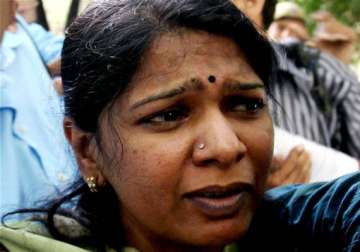No Bail For Kanimozhi, 7 Others
New Delhi, Nov 3: Dashing the hopes of DMK MP Kanimozhi and seven other accused in the 2G case, a Delhi court today dismissed their bail pleas saying the charges levelled against them were of

New Delhi, Nov 3: Dashing the hopes of DMK MP Kanimozhi and seven other accused in the 2G case, a Delhi court today dismissed their bail pleas saying the charges levelled against them were of “grave nature”.
The court rejected CBI's stand of not objecting the bail pleas of Kanimozhi and four others saying its concession was of “no consequence in the eyes of law”.
The CBI stand triggered hopes in the accused that they would now now be able to get bail after the Court had framed charges and the Supreme Court had told the accused that their bail plea could be raised then.
“I may add that such an objection/concession given by the prosecution to the bail plea of an accused is of no consequence in the eyes of law as the bail plea is required to be decided strictly and solely as per the law and facts and circumstances of the case,” Special CBI Judge O P Saini said.
The CBI had preferred not to oppose the bail pleas of Kanimozhi, Kalaignar TV MD Sharad Kumar, Kusegaon Fruits and Vegetables directors Asif Balwa and Rajiv Agarwal and Bollywood filmmaker Karim Morani, whose names had figured in the supplementary charge sheet filed on April 25.
The accused have been in the jail for last five to nine months. Kanimozhi had been in jail since May 20. Besides the five accused, the court also dismissed the bail pleas of former Telecom Secretary Siddharth Behura, former Telecom Minister A Raja's erstwhile Private Secretary R K Chandolia and Swan Telecom promoter Shahid Usman Balwa.
Brushing aside the CBI's no objection, the judge said, “No objection by the prosecution to the bail plea of an accused may carry some weight in the facts and circumstances of a given case but where the allegations and charges levelled against the accused are of grave nature, such no objection, in my humble opinion, is of no legal consequence.
“There is no distinction between the accused charged on the basis of main charge sheet and supplementary charge sheet. There is only one charge sheet in the eyes of law.”
The court said the 2G case is of grave magnitude resulting in huge pecuniary benefits to the two accused telecom firms—Swan Telecom and Unitech Wireless (Tamil Nadu) Pvt Ltd—due to the criminal misconduct, breach of trust and other offences committed by the accused. The court, in its 76-page order, also rejected pleas by Kaninmozhi's counsel for bail on the ground of being a woman as prescribed under section 437 of the CrPC.
The judge said the provision of section 437 of the CrPC give benefit to a woman for the reason that they are generally considered weak and exploited, both socially and economically, and as such, requires some extra protection, but Kanimozhi, being an MP, belongs to upper echelons of the society.
“Accused Kanimozhi Karunanithi belongs to upper echelons of society and is also a member of Parliament. By no stretch of imagination, she can be said to be suffering from any discrimination on the ground of being a woman,” he said.
Dismissing Morani's submission that he was sick and was not in good health and should be granted bail as per section 437 of the Cr PC, the judge said the medical records do not suggests that “standard of illness of Morani is so high as to categorise his custody as detrimental to his health.”
“Accordingly, in the facts and circumstances of the case, as narrated above, the benefits of this beneficial provision, do not accrue to them,” the judge said.
Regarding the contentions of the defence counsel that they should be granted bail as there was no apprehension of their influencing the witnesses or tampering with the evidences, the court said this is a case of “unprecedented nature” which suggests that witnesses would be under a lot of pressure.
The court said most of the witnesses in the case were relatives, employees, colleagues and subordinates of the accused and the fear of their being influenced is “well founded”.
“In one situation, a case may be simple but conduct of the accused may be bad and in another case, conduct of the accused may not be objectionable, but facts and circumstances of the case may be serious, warranting inference of possibility of evidence being tampered with.
“In the instant case, nothing objectionable has been pointed out as far as the conduct of the accused persons is concerned.
“However, this is a case of unprecedented nature. The facts and circumstances of the case itself suggest that the witnesses would be under a lot of pressure, given the serious consequences of the case for the parties,” it said.